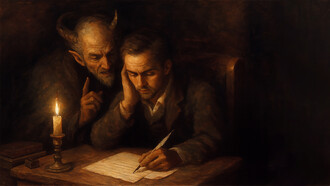Nineteenth-century German philosopher Friedrich Nietzsche predicted that the future of the next two centuries would consist of wars and calamities the likes of which humanity has never before seen. He attributed these calamities to the “death of God” and its consequent nihilism. With the death of God, he proclaimed, “everything is permitted.” Under this scenario, “the highest values devalue themselves,” and we are left with no authentic values, only with will and power and their manifestations as a “will to power.” The Nazis glorified the “will to power,” as exemplified in Leni Riefenstahl’s classic 1935 Nazi propaganda film, Triumph of the Will.
Today, the MAGA movement in the United States and similar Neo-fascist movements in Europe derive from these sources—even when they claim to be reasserting fundamental Christian values, etc. Western values in general derived from the Greek philosophers, followed by Roman civilization, and the appropriation of these traditions by a Christian (and Biblical) religious cosmological understanding of our human situation. The world was created by a loving Supreme Being who combined creative power with supreme value—all knowing, all powerful, and all good. The world, therefore, was created as a home for the creature made in God’s image who is given dominion over the beasts and the capacity to cultivate and domesticate the earth.
As such, existence and value coincided as, for example, in Romans 2:14, where St. Paul declares that when “Gentiles who do not have the law do by nature what the law requires, they show that the law is written on their hearts.” Creation is lawful, human beings are under the command of the natural moral law, and the laws of both have been given by a supremely good and loving deity. This religious cosmology begins to disintegrate with the rise of early modern science in the 17th century and its famous “Copernican Revolution.”
French philosopher René Descartes helped facilitate this revolution by sharply distinguishing the human mind (res cogitans) from the material world (res extensa). Res extensa was still created by God, but it was a reality entirely separate from the mind, a different “substance” governed by the deterministic natural laws of early-modern science (formulated as a cosmological paradigm by Sir Isaac Newton in 1687). Gone was the world as a home for human beings presided over by a loving God. What commenced was the sense of a human subjectivity entirely alien from a natural world in which God no longer interfered.
The early-modern thinkers consequently formulated a philosophy of “Deism,” meaning that God created the world-machine long ago but does not interfere in the deterministic working of that machine, existing as a kind of deus absconditus in the remote background. The world is no longer a home but an alien context in which humanity finds itself. In his Pensees, published in 1670, Blaise Pascal wrote, “Cast into the infinite immensity of spaces of which I know nothing, and which know me not, I am frightened.” The world as a home for humanity presided over by a caring personal God is gone. We are no longer at the center of creation. The Copernican Revolution has shunted us to insignificance, to the periphery, to a situation of accident and contingency.
As Nietzsche was later to express this, “since Copernicus, man seems to have got himself on an inclined plane—now he is slipping faster and faster away from the center into—what? Into nothingness? Into a penetrating sense of his nothingness.” Concomitant with this growing alienation from the world as a home for humanity, informed by a logos that connected both fact and value, was the emergence of a new sense of freedom. Freedom is no longer the capacity to choose what is right as defined by both revelation and natural law, freedom is now vastly expanded, free of all law, free to create its own laws. One thinks of Jean-Paul Sartre’s Being and Nothingness (1943) in which the human mind exists in a vacuum of pure freedom, encountering no guidelines, laws, or goals within which to operate.
Already in 1927, Martin Heidegger had published Being and Time, in which human beings are considered “thrown” (arbitrarily and randomly) into the world and must, without external guidance, struggle to live an authentic existence in the face of their own death. In this book, we must transcend our inauthentic habit of seeing time as an external “space” within which we live and begin comprehending that we exist as temporality, as recalling a past and projecting toward a future that always takes precedence over the past and present. We hurry towards the nothingness of death without ever experiencing a fullness and meaning in the present moment, always evading the present in favor of a future that never arrives. In doing this, according to Heidegger, we authentically face the “truth” of our human situation.
Nihilism is the claim that there are no objective values and that human beings exist within a meaningless universe that does not know or care about us. We are left simply with this radical freedom within an ontological vacuum—an unfeeling, mechanized, deterministic universe. Within this framework, without objective values that we might all (eventually) agree upon, we find that all that is left is “will” and power.” If we come to political power, we can take over the educational service to instill our own made-up history to replace what experts and scholars have confirmed took place. We can lie about our selfish motives, or our desire to achieve power for its own sake, because truth and lie become slaves to will and power. They have no independent reality beyond human subjectivity.
Religious fundamentalists can come up with absurdities like “creation science,” in which God is seen as creating “evidence” that the world is billions of years old, while in reality it is only about 6000 years, as indicated by the Bible. The horrors of World Wars I and II, the horrors of war, torture, and attempts to exterminate one another appear as all that we know. We can project our hate and fear on some out-group and seek power over that group, giving our lives a sort of surrogate meaning through the struggle, conquest, and anticipated victory. But ultimately, there is nothing else. We place the Ten Commandments on classroom walls in the hopes that children will learn to blindly follow this arbitrarily imposed order rather than learning to think critically for themselves. However, this is mere foolishness, because thinking critically is intrinsic to our freedom, to what we are as human beings.
We demonize the Russians, or the Chinese, or the Blacks, immigrants, or Jews in order to give some negatively generated meaning to our miseries and difficulties, which otherwise might open to awareness the apparent nothingness and meaninglessness of our human situation. We prioritize our own race, or religion, or nation so that we can feel we have some genuine values that appear because we are struggling against what is not us. Nihilism lies in the background—the nihil, the nothing, the arbitrariness of our existence in an unfeeling universe. At bottom, there is only the will to power and no genuine values. As journalist Chris Hedges once put it, “War is a force that gives us meaning.”
Because nihilism begins with the false premise that there is no truth, it resists and rejects the new paradigm that has developed out of the sciences, much religion, and much philosophy since the early 20th century. This new paradigm embraces such well-known names as Henri Bergson, Alfred North Whitehead, Karl Jaspers, Paul Ricoeur, Jürgen Habermas, Pierre Teilhard de Chardin, Raimon Panikkar, Ken Wilber, and Ervin László. The truth of the new paradigm derives from the deep coherence of multiple dimensions and sources. It also derives from an internal growth in self-awareness that goes far beyond the early Heidegger’s authenticity of a creature “thrown” into the world, facing its own death within a framework of early modernity’s “infinite spaces.”
In my books and articles, I have often referred to this new paradigm as “evolutionary holism.” Science, and human beings, are discovering that we are the leading edge of a cosmic process of transcendence that places us not only back at the center (in a certain sense) but recognizes in us a process of “deification” in which the nisus of the cosmic process is coming to awareness and emergent freedom in us. With the possible exception of Habermas (who is also an evolutionary-holistic thinker), all of the above-named thinkers express this idea in one way or another. The outdated Newtonian Paradigm, however, is still operative in our economics, nation-state systems, in our political, and often religious assumptions.
Making the transition to this new paradigm not only overcomes nihilism as an abstract background assumption, but it may well be the only route to human survival beyond our currently endangered future. Fyodor Dostoevsky’s famous parable of The Grand Inquisitor may help to illuminate our situation. In the parable, the Inquisition is raging in 16th-century Spain, and heretics are being burned at the stake. Jesus returns to Earth and begins preaching about freedom to the masses, thereby attracting a following. The Cardinal has him arrested and brought before him. Jesus is silent, noncombative, and lovingly mild while the Grand Inquisitor engages in a soliloquy about how wrong Jesus was to offer freedom to the masses when what they really want is bread, miracles, and institutionalized slavery that takes freedom from them for their own good. Jesus is silent, loving, and the Inquisitor ends with the bone-chilling words: “And tomorrow, I will burn you at the stake.”
The divine dimension at the heart of the Cosmos has gifted us with the miracle of freedom, and today’s neo-fascists do everything in their power to reject, deny, and destroy our common freedom. The early-modern paradigm could see no freedom in the universe, only atomism, mechanism, and determinism, and it left human beings with only a contingent, accidental consciousness in which values were thought to be “merely subjective.” The nihilism of today’s neo-fascists, who substitute will and power for the authentic search for values arising from our intrinsic freedom, is the result of this despair. They claim “no-truth” (or at the same time cling to absurd, fundamentalist “revealed truths”), but the human and cosmic truth is there in and as human freedom itself. In their desperation, they attack freedom itself in the name of religion.
The new paradigm challenges people to grow conceptually and spiritually far beyond the Medieval view of the universe in which human beings were at the center of a whole apparently made for their well-being and salvation. The new paradigm reveals to us an unimaginably vast cosmic whole moving through unimaginable periods of billions of years to bring freedom out of the apparent necessity of cosmic matter and energy. And freedom does not come with any guidebook outlining some easy set of values. There is no list of Ten Commandments to be posted on every classroom wall.
Freedom arises from the whole. All things are wholes within greater wholes (“fields within fields”), and wholes are more than the sum of their parts, at the same time that the parts are uniquely valuable and necessary to their wholes. Our human body-mind unity is perhaps the best example of this dynamic. Composed of some 37 trillion cells and innumerable parts like muscles, organs, and internal systems working together, what emerges as a unified whole is a marvel of beauty, simplicity, integration, harmony of movement, and freedom. The wholeness of each person utterly transcends the vast collection of interacting parts that make up our mind-body selves.
Freedom is the source of our common human dignity. And this dignity is now seen as emergent through the entire evolutionary process, a process that lends a lesser but real dignity to all living creatures and the ecosystems of which we are all parts. The slow emergence of freedom out of billions of years of evolutionary development has galvanized into a qualitative upsurge with the emergence of human freedom. The evolutionary nisus has been gifted to us, and our immense responsibility is to embrace this awesome gift and its implications with love, wisdom, and passionate authenticity.
But like the humanity of the people in 16th century Spain and their spokesman the Grand Inquisitor, in practice we still prefer a Hitler or a Trump to take away our freedom, rewrite our history, establish endless wars against imagined enemies (such as Chinese, Russians, Palestinians, immigrants, Blacks, or socialists) and dictate some rote list of how we should behave to be posted on classroom walls. In the name of Christianity or “making America great again (MAGA)” we desecrate the freedom and dignity of the whole of humanity gifted by God which carries with it the frightening and awesome task of taking responsibility for the emergence and direction of the evolutionary process of the universe itself (at least, for our portion and part in this process). As Eastern Orthodox Christianity all along has intuited, our freedom involves a process of “deification” gifted to the whole of humanity.
To accept this gift would mean to abolish wars along with our puerile fears and hatreds. It would mean working together to save our collapsing environment and to disarm the nations of all weapons of mass destruction. It would mean beginning to truly see one another as fully human. It would mean to engage in conscious evolutionary growth toward ever greater love, compassion, tolerance, justice, mutual understanding, and social coherence. It would mean working to unite humanity within the requirements of our common gift of freedom, and to ratify a Constitution for the Federation of Earth to institutionalize, empower, and enable this gift of freedom to effectively undertake its cosmic, divinely-inspired mission.
The new paradigm of evolutionary holism overcomes nihilism, a nihilism derived from the now entirely outdated paradigm of early-modern science. It demands that we concern ourselves with growth toward the maturity of worldcentric and cosmocentric consciousness, both of which can be associated with the love (agape) taught by Jesus or the compassion (karuna) taught by Buddhism, and so on for all the world’s great religious visions. It reveals clearly that we are one species, with one universal dignity, integrated into one, holistic biosphere, and that our own astonishing body-mind wholeness makes us a microcosm of the holistic macrocosm of the Cosmos.
Will and power are superseded by brotherhood and cooperation. Sovereign nation-states are superseded by the sovereignty of humanity. Capitalist greedy destruction of nature is superseded by an ecological economics that protects the whole and all the precious parts (human beings and other living creatures) that make up the whole. And human beings emerge as one cosmic community of freedom and dignity living in peace on our precious and beautiful planetary home, embraced by a single, dynamic, and democratic Earth Constitution. Then, and only then, will our real task and mandate as microcosms of cosmic freedom truly begin.















